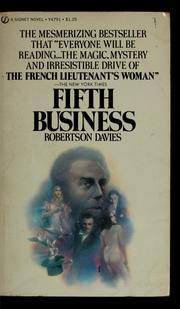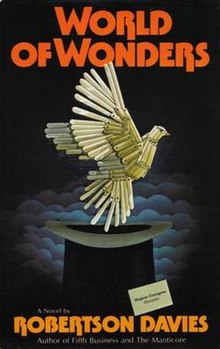I’ve admired Robertson Davies and his three trilogies (Salterton, Deptford and Cornish) for decades. He is very old-fashioned now, but it was the same when he was alive. He was an Edwardian figure when I saw him strolling down Harbord Street in the late eighties, proceeding slowly and assuredly, with cape and a walking stick. Some of his attitudes were long out of date at the time, such as that Massey College, which he helped found in 1963, did not admit women until 1974. In some ways he was quite modern. Generally, though, Edwardian, but that is by no means a bad thing.

The first of the Deptford trilogy is Fifth Business (1970), which I’ve always liked, but it seems very old. Anyone writing a novel of that form now would be self-consciously recreating a work of a century ago, but that was his style fifty years ago: from fifty years before. It’s a very Canadian novel, but of a Canada that no longer exists. I still recommend it to anyone who wants to see what Canada (and Toronto) used to be like, but those who’ve read it don’t seem to like it.
The Manticore (1972) is the story of a minor character from the previous novel going through Jungian analysis in Switzerland. It’s still a wonderful introduction to Jung and his ideas about dreams and archetypes.

The last of the three is World of Wonders (1975), where Magnus Eisengrim, a magician who’s been a secondary figure in the previous books, relates in detail three episodes from his early life: in a third-rate carnival as a child in the 1920s; in a theatre company as a young man; and (briefly) repairing clockwork figures in Switzerland. He is performing the magic in a TV show about Robert-Houdin and is seized with the desire to reveal his past.
The novel is about 350 pages long, and 325 of it is Eisengrim talking. He talks and talks and talks and talks. Even allowing for the conceit of him explaining to his friends and the TV people how he became who he is, the length and language of his conversation are preposterous. Of the other 25 pages, about five are spoken by one woman, and the other twenty by the other men.
Eisengrim goes on and on and on and on, filling in many details about carnivals and touring theatre companies and magic and acting, all things I’m interested in, but he goes on and on and on and on. At great length. I had to skim. I’ll reread the other two books, but not World of Wonders. I just couldn’t take this man talking so much, trying to overwhelm us with all this erudition and these incredible experiences, be they wonderful or horrible.
I realized: This is what all of Robertson Davies is like for most people now.
 Miskatonic University Press
Miskatonic University Press